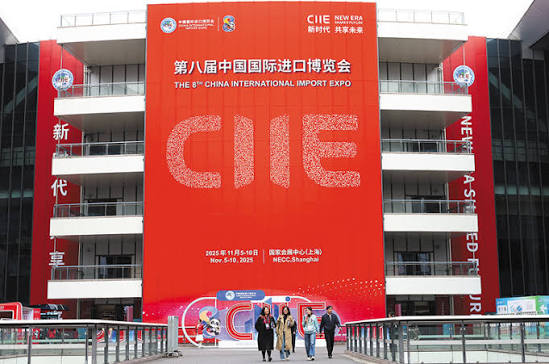By Nkechi Eze
China has formally invited Nigeria to participate as Guest of Honour at the 8th China International Import Expo (CIIE), signalling a significant elevation in bilateral relations and underscoring Nigeria’s growing prominence in global trade diplomacy.
The invitation, personally conveyed by China’s Ambassador to Nigeria, Yu Dunhai, was described as a mark of high esteem for Nigeria’s expanding role in the global economy and as a cornerstone of China’s Africa policy. The announcement was confirmed in a post by the Chinese Embassy’s verified X handle late Wednesday, stating that Nigeria’s participation as Guest of Honour “reflects its expanding role in global trade and its importance to China’s African policy.”
The 2025 edition of the CIIE, which opened on November 5 and runs through November 10 in Shanghai, has attracted an impressive 3,400 exhibitors from 129 countries, occupying over 420,000 square metres of exhibition space at the National Exhibition and Convention Centre. Within the first 24 hours, trade deals worth $12.3 billion were reportedly signed, according to data from the Chinese customs authority.
Nigeria’s 500-square-metre national pavilion, designed in the country’s iconic green and white colours, has emerged as one of the most prominent displays at the expo. The pavilion showcases a wide range of innovations and export-ready products from Nigeria’s agricultural, manufacturing, and technology sectors.
Leading Nigeria’s participation, the Executive Director of the Nigerian Export Promotion Council (NEPC), Nonye Ayeni, unveiled several high-value innovations, including bio-fortified cassava, affordable solar irrigation pumps, and blockchain-tracked shea butter, each representing Nigeria’s commitment to innovation, sustainability, and value addition in its export portfolio.
“China’s vast consumer market offers an enormous opportunity for authentic African products. We are here to connect those consumers with Nigeria’s creativity and enterprise,” Ayeni said during her presentation.
The diplomatic gesture follows less than two months after the official visit of Chinese Premier Li Qiang to Abuja, where he pledged $2 billion in concessional loans to support Nigeria’s critical infrastructure and energy development projects.
In a related development, Ambassador Yu hosted Nigeria’s National Security Adviser (NSA), Mallam Nuhu Ribadu, to a working dinner in Shanghai on Tuesday. The two officials signed a protocol agreement on maritime cooperation, covering joint patrols in the Gulf of Guinea and shared intelligence on piracy, a move expected to strengthen regional maritime security and deepen military-to-military collaboration between both nations.
A spokesman for the Chinese Embassy described the agreement as “another step in strengthening mutual trust and advancing the comprehensive strategic partnership between China and Nigeria.”
Meanwhile, the Speaker of the House of Representatives, Rt. Hon. Abbas Tajudeen, led the delegation of the Nigerian Parliament to the Expo, reaffirming Nigeria’s commitment to expanding bilateral trade and institutional cooperation under the CIIE framework.
Bilateral trade between Nigeria and China has continued to grow, reaching $22.6 billion in 2024, though Nigeria’s non-oil exports to China remain modest at under $700 million. To address this imbalance, China has recently granted zero-tariff treatment to 98 per cent of Nigerian tariff lines, a measure expected to accelerate the export of agricultural commodities such as sesame, ginger, and hibiscus tea.
Further strengthening market access, Chinese e-commerce giant Tmall Global has allocated dedicated online shelf space for Nigerian products, paving the way for direct consumer engagement and digital trade expansion.
Despite Nigeria’s outstanding debt of over $4 billion to Chinese policy banks, the Federal Government maintains that the relationship remains mutually beneficial and strategically balanced, emphasizing shared goals in industrialization, technology transfer, and export diversification.
President Bola Ahmed Tinubu’s administration continues to view China as a critical partner in its national development agenda, particularly in advancing infrastructure, manufacturing, and trade competitiveness.
Nigeria’s Guest of Honour status at the 2025 China International Import Expo thus marks not just a ceremonial recognition, but a bold statement of deepening economic cooperation, mutual trust, and shared vision between Africa’s largest economy and the world’s second-largest economic powerhouse.

















